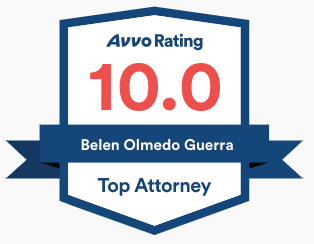Aggravated Harassment
Handling Even The Most Complex Personal Injury Cases in Arizona
Home » Criminal Defense » Aggravated Harassment
PRACTICE AREAS
Phoenix Aggravated Harassment Attorney
Criminal Defense Law Firm Serving Maricopa County, Navajo County, Yavapai County, and Beyond
While the penalties for a harassment charge don’t seem particularly severe in some lights, a conviction can stay with you for years, plaguing your career, your personal relationships, and every other aspect of your public life for years to come. Repeat offenses can even land you with a felony charge of aggravated harassment.
So, what should you do if you’re dealing with aggravated harassment charges in Arizona?
The first thing you should do is call a competent criminal defense lawyer with experience in Arizona harassment cases. At the Belén Law Firm, our Phoenix criminal defense attorneys can provide you with dedicated legal assistance throughout your entire experience with the Arizona court system and help you obtain the best outcome possible. Read on to learn about the ins and outs of harassment in Arizona, what turns harassment into aggravated harassment, and what we can do to help. You can also give our office a call at 602-715-0908 or send us a message to schedule a free consultation today.

What is Considered Harassment in Arizona?
Arizona law defines harassment as “conduct that is directed at a specific person and would cause a reasonable person to be seriously alarmed, annoyed, or harassed”.
This could include surveilling that person, sending harassing communication, making false police reports against that person, following a person after being asked to stop, and a variety of other behaviors.
Notice how much the alleged victim’s fear matters: if they do not feel seriously alarmed, annoyed, or harassed, then it is not legally considered harassment.
Arizona Harassment Laws
There are several different types of harassment under Arizona law, including aggravated harassment. It is also important to note that for Arizona courts to determine something is harassment, the alleged perpetrator must have acted with intent to harass, and with knowledge that they were harassing the other person. Because intent and knowledge are difficult to prove, a harassment defense lawyer could use this as a defense in court.
Below, we’ll describe the other types of harassment charges in Arizona:
Harassment Against a Private Party
This type of harassment is sometimes known as simple harassment. Assuming you acted with knowledge and intent, you can be charged with harassment over any of the following six actions:
- Contacting, communicating, or causing communication in any way by any means in a manner that harasses. This would include phone calls, emails, letters, comments on social media, and many other means of communication
- Continuing to follow another person in or about a public place for no legitimate purpose after being asked to stop
- Surveilling or causing another person to surveil someone for no legitimate purpose
- Repeatedly committing one or more acts that harass someone
- Making a false report to law enforcement, a credit agency, or a social service agency on more than one occasion
- Interfering with the delivery of any public or regulated utility to another person
If you are convicted, this type of criminal harassment is a Class one misdemeanor.
Harassment Against a Public Officer or Employee
This is a provision in Arizona law that protects state-employed officers and employees from harassment. It prohibits filing a nonconsensual lien against public employees unless one of the following conditions is met:
- The lien is accompanied by a court-ordered injunction
- The lien is issued by a government entity
- The lien is issued by a licensed utility or water delivery company
- The lien is issued by a mechanics’ lien claimant
- The lien is issued by an entity created under covenants, restrictions, conditions, or declarations affecting real property
If none of these conditions are met, harassment against a public officer or employee is considered a Class 5 felony.

A.R.S. § 13-2921
Arizona Revised Statute § 12-2921 is the statute under Arizona law that defines harassment. In addition to the two types of harassment we have already outlined, ARS § 13-2921 also makes provisions for the following situations.
Behavior is not harassment if any of the following conditions are met:
- The behavior is part of a lawful demonstration, assembly, or picketing
- The alleged perpetrator is a professional investigator or peace officer licensed by the state and acting within the scope of the law and their own duties, in connection with any criminal or civil investigation
- The alleged perpetrator is a certified and authorized process server acting within the scope of their duties in connection with any judicial or administrative action or proceeding.
What is Aggravated Harassment?
There are a few conditions under which harassment becomes aggravated. This is a very serious criminal charge, and not only carries prison time, but hefty fines as well.
In Arizona, aggravated harassment consists of repeat offenses that, for the most part, involve the same victim. To charge someone with aggravated harassment, a prosecutor must prove beyond a reasonable doubt that:
- The repeated harassment violates a restraining order, an order of protection, or an injunction. For example, if the person allegedly harassed by the defendant has a restraining order against them, and the defendant continues to call and email the alleged victim, the defendant could be charged with aggravated harassment
- The defendant had a prior conviction of domestic violence in Arizona
In the first scenario, when the harassment violates an order of protection, it is considered a Class 6 felony. For a second violation (if the defendant continued to violate the order), this is upgraded to a Class 5 felony.
In the second scenario, harassment charges with a prior domestic violence conviction are a Class 5 felony. If that prior conviction involved the same person, it remains a Class 5 felony.

Can You Go To Jail for Harassment Charges?
The short answer is: possibly, yes. The charges for harassment in Arizona range from a Class 1 misdemeanor to a Class 5 felony. While a first-time harassment charge doesn’t seem like much, aggravated harassment charges carry far more severe punishments. If you or a loved one is dealing with harassment charges, you need a strong defense. Call the law offices of Belén Olmedo Guerra as soon as possible and our experienced legal team can begin building your defense. Below, we’ll detail the various penalties for each of these classifications.Penalties for Aggravated Harassment in Arizona
These are the penalties a court might sentence a defendant faced with criminal charges of harassment:Class 1 Misdemeanor
For a Class 1 misdemeanor, you might receive six months in jail and a fine of up to $2500. The court could also impose community service, mandatory education, and probation.Class 6 Felony
A Class 6 felony for a first-time offense carries a maximum prison sentence of 18 months, while an aggravated felony extends the maximum sentence to 2 years. If you are already a convicted felon and receive a Class 6 felony charge, the maximum sentence extends to 2.25-4.5 years, or 2.75-5.75 years for repeat offenders of aggravated felonies. Felonies in Arizona carry a maximum fine of $150,000.Class 5 Felony
A Class 5 felony for a first-time offender carries a maximum prison sentence of 2 years. For an aggravated felony, that extends to 2.5 years. For repeat offenses, the maximum sentence increases to 3-6 years. For aggravated felonies, this extends to 3.75-7-5 years. For a more nuanced breakdown of felony charges in Arizona, take a look at our Arizona felony sentencing chart.
Possible Defenses Against Harassment Charges
During your initial consultation with your Phoenix harassment attorney, we’ll discuss a variety of possible defenses that might work for you. Here are four of the most common:
Proving Lack of Intent or Knowledge
Like we previously mentioned, in order to commit harassment, the defendant must be aware that his or her actions were considered harassment.
Since it’s difficult to prove knowledge or intent, this is often a valid defense for a harassment lawyer to use in court. Even if the alleged victim was annoyed, alarmed, or harassed, if the defendant was unaware, they cannot be charged with legal harassment.
Proving the Victim was Not Seriously Alarmed, Annoyed, or Harassed
This is a common defense when the criminal case is brought without the victim’s full consent. Even if the defendant knew their actions were harassment and the behavior is legally harassment, if the victim does not feel harassed, the defendant cannot be charged with harassment.
For instance, consider a concerned parent who repeatedly shows up at their adult child’s college dorm to check on them. Eventually, when the parent has repeatedly demanded entry to their child’s dorm, campus police become involved. The parent is arrested, and the DA decides to file harassment charges. If the child in question does not feel harassed by their parent and considers the behavior an act of loving concern, a good harassment attorney can have the charges dismissed on those grounds.
Lowering the Charges
In cases of a Class 6 felony, Arizona courts are allowed to lower the charge to a Class 1 misdemeanor in certain circumstances. Mostly, this occurs with a first-time, nonviolent offense. Taking advantage of this can be the difference between spending 6 months in jail versus 2 years in prison. Though this is similar to taking a plea bargain, it does not require negotiation directly with the prosecutor where they lower the charge in exchange for a guilty plea; rather, this is a decision made directly by the court when you have committed a non-violent offense and have no prior criminal record.
Miranda Rights Violations
This is a common defense in criminal court. It is the arresting officer’s duty to read you your rights, and you are entitled to every single one of them. If the arresting officer does not read you your rights, or if they fail to deliver on any of your rights, evidence can be thrown out.

Experienced Criminal Defense Attorney for Aggravated Harassment Charges in Phoenix, AZ
Dealing with harassment charges can be a physical and emotional drain on you and your loved ones. If you’ve been arrested for aggravated harassment in Phoenix, Arizona, you’re entitled to a legal defense that will get you the best outcome possible. Belén Olmedo Guerra is an experienced and thorough criminal defense attorney who can guide you through your case from start to finish. Call the Belén Law Firm today or fill out our online intake form for a free initial consultation.
Set Up Your Free Consultation
What Our Clients Say



















